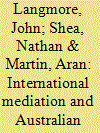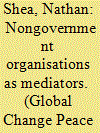| Srl | Item |
| 1 |
ID:
151991


|
|
|
|
|
| Summary/Abstract |
In October 2012, Australia's parliamentary Joint Standing Committee on Foreign Affairs, Defence and Trade recommended that a mediation support unit should be created within the Australian Agency for International Development, a department now amalgamated with the Department of Foreign Affairs and Trade. The question is: Does Australia possess the motivation and capacity to implement active and effective international mediation by building the capacity of intermediaries to deploy various peacemaking methods to hasten de-escalation at different stages of a conflict? If not, is a mediation support unit an appropriate initiative to address this capability gap? This article draws on quantitative conflict data sets and an expert panel to conclude that Australia's track record demonstrates significant capacity to undertake international mediation, but that the mediation personnel and processes available to government are insufficiently resourced and coordinated to readily provide policymakers with accessible tools to undertake the diverse range of mediation strategies advocated by conflict scholars. While a mediation support unit would address some of these issues, at present it conflicts with the Department of Foreign Affairs and Trade's institutional philosophy based on diffused expertise.
|
|
|
|
|
|
|
|
|
|
|
|
|
|
|
|
| 2 |
ID:
144297


|
|
|
|
|
| Summary/Abstract |
The emergence of international NGOs mediating in intrastate conflicts has been labelled by The Economist as ‘privatizing peace’. This article explores this growth and the tensions brought about by the unofficial standing of NGO mediators. Primary among these is the power differential experienced by weak mediators, whereby they are perceived as unable to deploy the necessary inducements to create conditions favourable for a resolution. This article reviews NGO strengths and weaknesses as mediators by undertaking a case study analysis of the role of the Centre for Humanitarian Dialogue (1999–2003) and the Crisis Management Initiative (2005) in the peace processes in Aceh, Indonesia. It is concluded that despite evident limitations in terms of resources and leverage, within the specific context of the Aceh conflict, the characteristics of the NGO mediators and the mediation strategies adopted by the NGOs allowed them to implement an effective mediation process, and resulted in favourable mediation outcomes.
|
|
|
|
|
|
|
|
|
|
|
|
|
|
|
|